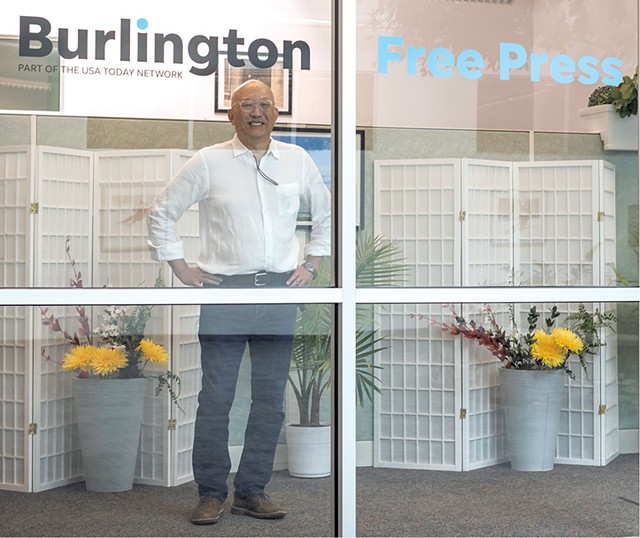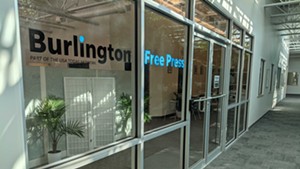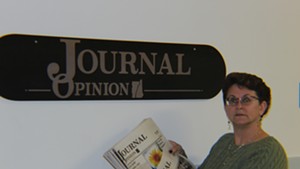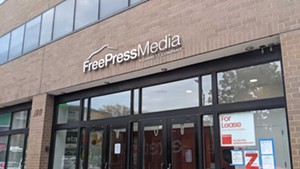
- Luke Awtry
- Aki Soga at Free Press headquarters in Williston
Playful pit bulls, White House holiday traditions and summer reading reviews: That's the skimpy fare provided these days by the once-proud Burlington Free Press. It's a jarring step down from the news and analysis that once made the state's flagship newspaper a must-read.
Aki Soga, the newly appointed top editor, isn't happy about the dearth of local news in the Free Press. But with newspapers shrinking or dying all over the country, he also knows there's not a lot he can do to restore the paper's reporting firepower right now.
"We've spent a number of years trying to figure out how we're going to cover the community under these different circumstances," said Soga, who has been at the paper for three decades.
Now it's Soga's charge to figure it out. He was appointed the top editor late last month, succeeding Emilie Stigliani, who left in March for a newspaper job in California.
Soga, 63, was born in Japan and grew up mostly in Michigan. He started his newspaper career in Japan, then moved to Burlington in 1991 for a job as a Free Press reporter on the features and business desk. He later served as business editor.
He led the paper's opinion section from 2006 to 2018. In 2012, he was a Pulitzer Prize finalist for his editorials on open government. More recently, Soga was writing analysis and commentary as engagement editor when he was tapped for the top newsroom post.
As editor, "part of my job is going to be explaining to people who ask what our mission is now," he said. Asked to do so, Soga said the goal is to increase circulation, as it has always been. The company is promoting online readership but wants to avoid cutting back any further on its print product, where the revenues are.
"We have to offer something that's different than what is readily available from other sources and make it worth subscribing to our website," he said.
Soga remembers when there were 60 people in the Free Press newsroom, which featured a full copy desk, a photo department and an executive editor who oversaw several layers of newsroom management. The newsroom — which moved from downtown Burlington to leased space in Williston last year — is now down to 10 reporters and just three editors, including Soga. At the end of March, the paper's print circulation averaged 5,484 from Monday through Saturday, just a fraction of its 31,095 a decade earlier, according to a report from the Alliance for Audited Media. Sunday circulation has plummeted, too, from 40,708 to 7,152.
The Free Press started out as a weekly in 1827, and became a daily in 1848. The paper was family-owned in 1971, when the newspaper giant Gannett bought it. In 2019, Gannett merged with another titan, New Media Investment Group, but kept the Gannett name.
Like other papers owned by that parent company, the Freeps is staying alive, but its local coverage barely has a pulse. It still publishes a print edition six days a week, but what comes off the press is mostly wire service copy and fluff gleaned from Gannett's USA Today. The paper hasn't had a dedicated Statehouse reporter for years and has no consistent coverage of Burlington City Hall. Some of the local news is days old by the time it makes it into print.
Christopher Graff, who led the Associated Press bureau in Montpelier from 1980 to 2006, remembers when an editorial endorsement by the Free Press was an important boost for political candidates.
"For decades — as a competing journalist — I would open the Free Press every day expecting to see a major scoop," Graff said. "They broke important news all the time. No more."
Graff noted that the Free Press is hardly alone in its woes. When the internet came along, it swept away the daily standards that drove newspaper sales and helped pay the bills, including classified ads, lottery numbers, stock reports and sports scores from around the country.
"The TV listings used to take up half a page every day," Soga recalled. While many papers have switched to online versions and news readership is high, nobody has figured out a way to make the kind of money online that newspapers did for years with lucrative print advertising.
Accordingly, a long and painful nationwide series of cuts, layoffs and newsroom closures that started about two decades ago continues today. The U.S. is losing newspapers at a rate of two per week, according to a report published last week by Northwestern University's Medill School of Journalism. More than 360 newspapers closed between late 2019 and the end of May 2022, the report said, noting that the U.S. had lost more than a quarter of its newspapers since 2005 and is on track to lose a third more by 2025.
At the Free Press, the shrinkage and consolidation have prompted corporate managers to replace much of the paper's skilled local news reporting with pablum created at centralized locations. A recent scan of online headlines included just one local news story — about a bridge in Winooski — and an array of public announcements and health tips. A 4-month-old farewell piece by Soga's predecessor, Stigliani, extolled the virtues of reading news online — and still claimed a marquee spot on the website.
Gannett does seem to be putting some energy into keeping its dailies going, but that means relying on regional, not local, reporting, said professor and pundit Dan Kennedy, who follows the company closely. Kennedy, who teaches journalism at Northeastern University, is watching the story of the Freeps play out in Gannett's holdings nationwide — particularly in the Boston area, where the company closed 19 weeklies this year and merged nine others into four.
Gannett is the largest newspaper chain in the country, with more than 100 daily newspapers in 46 states, Kennedy said. In February, the company announced it would move nearly all of its local staff reporters at its community weeklies to regional beats, he noted, eliminating or reducing coverage of city councils, mayors, selectboards and school committees.
"You've got good journalists working for them, but do they have enough firepower to cover the news? No," Kennedy said.
"Gannett, in my opinion, does seem to be trying to grope their way forward to a sustainable model," Kennedy added. "Unfortunately, they're trying to do it with as little journalism as possible."
One bright spot for Free Press readers is the sports department, where a two-person team is still producing thoughtful and substantive local stories that Soga said were often the most-read items on the website. The Free Press is the only print outlet closely following stories such as the development of the Vermont Green Football Club and the ascent of basketball star Ben Shungu, who starred at Rice Memorial High School and the University of Vermont before recently signing with a German pro team.
Local news is much more than just a nice way to learn what's happening in the community. It could alleviate some of the conflict that has come to characterize much of the national political discussion. Research shows that when communities lose their papers, fewer people run for local office and fewer voters turn out to choose a candidate at the polls.
"The loss of local journalism has been accompanied by the malignant spread of misinformation and disinformation, political polarization, eroding trust in media, and a yawning digital and economic divide among citizens," the Medill report said. "In communities without a credible source of local news, voter participation declines, corruption in both government and business increases, and local residents end up paying more in taxes and at checkout."
When it comes to local news, Vermont is a great place to be — both as a journalist and a reader, Soga said. The state stands out nationally for its local news coverage, especially in Chittenden County. Burlington-based Seven Days has a weekly print circulation of 35,000, and dozens of local reporters across the state are working for larger operations such as the online news service VTDigger.org and Vermont Public, the newly merged radio and television operation.
Soga noted that many communities the size of Burlington are worried about losing their last source of local news.
"We're in no danger of that," he said.
But even Vermont has been hit hard by the forces that have ravaged the industry. Graff remembers a time when Vermont had 44 locally owned radio stations, many with their own news departments. WCAX had a huge TV news team, and the Free Press, the Rutland Herald, AP and United Press International competed to break stories from the Statehouse.
Nowadays, the AP has a fraction of the staff it once did, and UPI is long gone. The Rutland Herald and the Free Press have both closed their Statehouse bureaus, and WCAX has scaled back its coverage considerably.
Soga is hopeful things can turn around — not to the glory days, perhaps, but to a place where the Free Press can return to more local news coverage. Even emerging from the pandemic will help, he said.
"I'd like to see us get back out into the community where reporters can spend more time reporting in person, seeing people face-to-face," he said.
For that to happen, Kennedy said, local news has to return to local ownership. The success of outlets such as Seven Days — which Kennedy has watched closely — show that it's possible to make money in the newspaper business, he said.
"You need independent, committed ownership and not a giant chain trying to bleed their property to generate revenues to ship them out of state in order to enrich their shareholders and pay down debt, which is exactly what Gannett is doing," Kennedy said.
Gannett has sold 23 papers to local owners over the past few years, according to Poynter, a nonprofit media institute.
With local ownership, "nobody is going to get wealthy, but people have been able to make a good living and serve their communities," Kennedy said. "I think that can still be done."
Disclosure: Anne Wallace Allen worked at the AP bureau in Montpelier from 1994 to 2004 and for VTDigger from 2018 to 2021. She also edited a newspaper that was acquired by GateHouse — now Gannett — in 2015.












Comments
Comments are closed.
From 2014-2020, Seven Days allowed readers to comment on all stories posted on our website. While we've appreciated the suggestions and insights, right now Seven Days is prioritizing our core mission — producing high-quality, responsible local journalism — over moderating online debates between readers.
To criticize, correct or praise our reporting, please send us a letter to the editor or send us a tip. We’ll check it out and report the results.
Online comments may return when we have better tech tools for managing them. Thanks for reading.